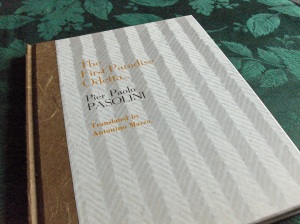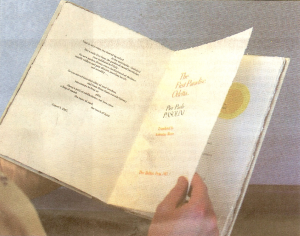“Paradise is a book in your hands” by Wayne Grady, The Whig Standard
Pier Paolo Pasolini, The First Paradise , Odetta… Translated and with a Homage to Pier Paolo Pasolini by Antonino Mazza, designed and published by Hugh Walter Barclay. Kingston: Thee Hellbox Press, 1985, $ 200.00
The Whig-Standard, May 19, 2009, Tuesday, 10:37:30 EDT AM
Now that Chapters/Indigo, the giant bookstore chain, has its ShortCovers program up and running, you can download a chapter from one of more than 300,000 books onto your iPod or iPhone for a small fee. You read it, click in an order for the book in print form, or else order more chapters until you have the entire book stored in digital form. As Joel Silver, Chapters/Indigo’s chief merchant, puts it, “We think of ShortCovers as the iTunes for books.”
Similarly, Google has digitized more than 7 million books and is preparing to make all of them available to anyone with a computer.
For now, you can Google a title, search the book by subject, and view “snippets” of it containing references to that subject, but soon you’ll be able to legally download the entire book.
In the United States, you can already download entire books onto Sony e-Book Readers or one of Amazon’s Kindles, and when our federal government finally passes its Amendment to the Copyright Act, Canadians will be able to read books on Readers and Kindles, too.
Each of these devices can store thousands of books in digitized form; you’ll be able to carry an entire library in your shoulder bag, so that if you suddenly have an urge to read a chapter of War and Peace while waiting in line next week to see Leonard Cohen at the K-Rock Centre, you’ll be able to take out your phone and do so.
But will it be a book that you are reading?
http://theehellbox.files.wordpress.com/2008/01/hpim3959.jpg
I am holding a book in my hands. It’s called The First Paradise, Odetta, and it contains a long poem by the Italian filmmaker and novelist Pier Paolo Pasolini, translated into English by the Ottawa poet Antonino Mazza.
The book is about the size and shape of my laptop, but there the resemblance ends. The cover boards are nearly a quarter of an inch thick; the paper that forms them has a herring-bone pattern which, when I tilt the book to the light coming in through a nearby window, appears as parallel rows of peaks and valleys.
The book’s title seems to float across the surface, resting on the peaks: “Pasolini was manic depressive, what today we call bipolar,” says the book’s maker, Kingston book artist Hugh Barclay of Thee Hellbox Press. “I designed the cover this way to indicate that Pasolini wrote the poem when he was in a manic phase.”
Pasolini was also an outspoken critic of the Catholic Church, and his poem is addressed to a young Catholic girl named Odetta. He was murdered in 1975, and after his death, a bronze medal was cast to commemorate his genius.
http://theehellbox.files.wordpress.com/2008/01/hpim3956.jpg
Barclay took molds from both sides of the medal and, by means of a vacuum-casting method, cast duplicates of them in rag paper fibre. He then embedded the casts deeply into the inside front and back covers of the book. In order to print the Italian version, Barclay had to hand-build accents onto his English typeface.
Pasolini’s poem, as well as Mazza’s translation, are centred on each page, except that the shorter lines are almost imperceptibly off-centre, a few m-spaces to the left.
“I gave the lines a slight left-bias,” explains Barclay, “because Pasolini was a Leftist.”
The handmade paper on which the poem and its translation are printed has a faint watermark: when I look through the paper, it says PPP85, for Pier Paolo Pasolini, 1985, the year the book was made. The text was printed when the paper was still damp.
“Of the 20,000 books published each year in Canada,” says Barclay, “only about 20 are printed on letterpresses, as this one was. And of those, only three are made from handmade paper, like this one. And only one book every 20 years is printed on dampened paper.”
When I again hold the book to the slanting light, I can see how the type jumps and sparkles on the page. “You only get that effect using dampened paper,” he says, smiling. “The poem jumps and sparkles,” he adds, “so I thought the type should, too.”
Barclay decorated the poem with linocuts that he engraved himself, subtle designs in the top right corner of some of the pages.
“When I read a poem, I see visual images that, to me, relate to the power of the words and the personality of the poet. And I incorporate these images into the book,” Barclay said.
As the Pasolini poem progresses, the orange-yellow images evolve from sun to flower to leaf and finally to a butterfly, “to show the metamorphosis endured by the young girl in the poem.”
The First Paradise, Odetta is unlike any other book in the world.
“All the elements are important,” Barclay says, taking the book from my hands. “They must all support each other to bring strength, beauty, importance, credence and meaning to the text, if only at a reader’s subconscious level.”
You may one day read Pasolini’s poem on your iPhone. But you will not have read this book.
Wayne Grady, Kingston, Ontario.

